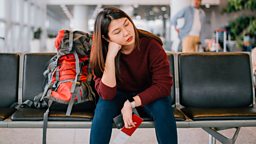Do any of these jet lag remedies actually work?
Travelling on long-haul flights for business or pleasure comes at a cost. But aside from the high ticket prices or carbon footprint, there's also an impact on your body, with fatigue, disorientation, irritability and the other common symptoms of jet lag.
From apps to IV drips, exercise to eating, there's an array of products and life hacks claiming to help weary travellers adjust to new time zones and avoid the grogginess.
Listener Moira suffered from a bad bout of jet lag after a trip to India and, with another long flight coming up, was keen to find out from BBC Radio 4's Sliced Bread whether these products or tips were just pie in the sky. Joining presenter Greg Foot to check the options is Dr Ben Edwards, an expert in the science of body clocks at Liverpool John Moores University.

Jet lag confuses your body clock
Jet lag is what Dr Edwards calls a “rhythm disturbance” to your body clock, and that’s significant because the body clock’s job is to synchronise all of the body’s cells and keep their molecules and proteins “in rhythm and in time”. This is known as ‘circadian rhythm’ and it takes its cue from the time of day and the light cues associated with it. By crossing multiple time zones your circadian rhythm has to undergo numerous readjustments, resulting in what we call jet lag.
You can alleviate jet lag by targeted exposure to light
In 2007, medical journal The Lancet published a paper on jet lag that recommended the best times to get light at your destination to mitigate its effects. For Moira’s recent nine-hour flight east across six time zones, accommodating the time difference, good local times for exposure to light are from 11am until 5pm. That's when you need to be getting good bright light into your eyes, to tell your misaligned internal clock what the external clock is doing. The best light is daylight, of course, but blue light is another option.
The findings also list bad times to get light – in this case the 3am to 9am window would actually confuse your body into thinking that you are staying up late rather than getting up early.
Find out more about blue light with Greg's investigation into blue light filtering glasses here.
Shifting your sleep
Greg mentions another app, Timeshifter, which advises modifying your sleep schedule in the days before you fly. Dr Edwards advises: “If you do a delay strategy, going to bed an hour later and getting up an hour later is generally well tolerated. But if you go to bed earlier, you're sat there for an hour waiting to fall asleep and you then get up earlier, so that causes sleep loss.”

Meanwhile, if you use the flight to get some rest and try and align your body clock with the local time, as Moira did on her flight to India, you’d be advised to wear an eye mask or get a sticker that says ‘Do Not Disturb’ just in case the dinner service on the plane wakes you!
Moderate exercise can help with jet lag, but you need to be cautious
Exercise can help with jet lag. “It works synergistically [with] light,” Dr Edwards says, “whenever you're trying to get light you should also do your exercise as well.”
However, Dr Edwards also advises: “When you arrive at the new time zone, reduce the duration and intensity of the exercise for the first three days because you're all out of sync, so you're going to increase the chance of injury. Also, your concentration levels are low, your motivation is low, and your irritability is up, so the last thing you want to do is start exercising hard.”
Adjusting your eating can help if you do it carefully
Another method for adjusting to your new time zone is to immediately adopt the local eating times rather than continue those of your home time zone. However, Dr Edwards flags up that “if you start putting lots of food through when your body thinks it's nighttime, and it's preparing to clear the lining of your gut and things like that, that's where you can start creating things like ulcers and gastrointestinal symptoms.”
The NHS actually advises staying in your normal routine if your trip is only for a few days, eg. for a business meeting, and not changing your eating or sleeping habits so that there is continuity from departure to return.
Melatonin is not recommended for jet lag
Melatonin is a compound naturally produced in the body that – according to Dr Edwards – works to drop core temperature by moving heat from the brain and torso to the arms and legs, a cooling process that aids sleep. It’s available in 3mg tablet form on prescription only, and product guidelines advise that it should be taken only between 8pm and 4am at your destination, and with a two-hour buffer zone before or after food. It can interact with other medicines so talk to a doctor beforehand if you’re taking it, and avoid combing melatonin with alcohol or any other type of sedative.
But even if you have been prescribed melatonin for jet lag, is it worth taking? “The consensus at the moment,” says Dr Edwards, “is that for people who normally sleep well, melatonin doesn't improve their sleep in the new time zone, and it doesn't increase adjustment in terms of whatever rhythm you measure.” Melatonin tablets are also not recommended for jet lag by the NHS because “there's not enough evidence to show they work”.
Any of the benefits you get from supplements can be obtained from a balanced diet
There are a range of supplements suggested for jet lag, including magnesium, B vitamins and vitamin C. Magnesium is claimed to decrease hyperactivity in the nervous system, making it easier to sleep, while vitamins B6 and B12 are said to boost energy and focus, aligning your circadian rhythm to make the waking hours in the new time zone easier.

Vitamin C, along with magnesium, the B vitamins and melatonin is included in a jet lag ‘prevention system’ called FlyKitt. They claim its inclusion is to “combat inflammation strengthen immunity and reduce oxidative stress caused by travel”.
Dr Edwards’ assessment of the supplements is that all of these vitamins and minerals can be obtained in sufficient quantities from a balanced diet, moreover, taking magnesium (and indeed) zinc can be toxic above a certain level. “You have to be really careful about over supplementing yourself,” he says. FlyKitt themselves say they are “using dietary supplement doses for specific physiological effects”, for example, large doses of vitamin B12 can enhance the sensitivity of the circadian rhythm to light.
In terms of vitamin C’s anti-inflammatory properties, FlyKitt say that “there is evidence of inflammation due to air travel” and that their anti-inflammatory approach also helps with inflammation due to poor sleep. But Dr Edwards says that jet lag specifically has “nothing to do with whether my joints are inflamed or not inflamed. That's a kind of immune response to something else.”
Costly IV drips aren't the best way to stay hydrated
There are some more invasive approaches that claim to prevent jet lag. One method is to use intravenous vitamin drips, costing anywhere from £150 to £350 for drop-in sessions before or after your trip. This method can involve various concoctions including vitamin C, magnesium, B12, L-taurine, L-carnitine, selenium and zinc.
Dr Edwards thinks the main benefit of these IV drips is preventing dehydration, which you can solve anyway by drinking water. And the former medical director of NHS England, Stephen Powis, said: “People who are healthy do not need IV drips. At best they are an expensive way to fill your bladder – and then flush hundreds of pounds down the toilet – but at worst they can cause significant damage to your health. ”
Humidiflyer masks may trap moisture but dehydration is not the cause of jet lag
Moira was interested in Humidiflyer masks that claim to ‘trap the expired moisture from your breath’ so that ‘when you breathe in, that moisture is then used to humidify the dry cabin air.’ This is supposed to combat fatigue, and Dr Edwards acknowledges that dehydration and fatigue are linked but that this doesn’t cause jet lag as noted above.
Nonetheless, since Covid, Moira is mindful of fellow passengers coughing and spluttering and says: “I like the idea of a mask that will supposedly protect me from everything and keep me hydrated at the same time.”
After hearing all about the options available, Moira says that she will definitely keep planning the best times to get light with her Garmin smartwatch, which, as Dr Edwards observes, may get more sophisticated with machine learning, and she will keep “trying to move my body clock a couple of hours before travel”.
Listen to the episode in full to hear Dr Edwards' final verdict on these products and techniques and find out more about the causes of jet lag.
-
![]()
Can you insulate your home for less than £100?
Can these DIY insulation hacks really save us energy and money?
-
![]()
Which pots and pans are best for your kitchen?
What material is best? And is non-stick coating really safe to use?
-
![]()
Do hair loss treatments actually work?
Do lotions and pills designed to help hair loss in men and women really work?
-
![]()
Can anti-ageing products help us to stay young?
Greg Foot investigates the pills that claim to help us to live longer and healthier lives.





